英语人教版九年级全册Unit 6
人教版英语九年级全册单元unit 6 知识点+测试卷+思维导图
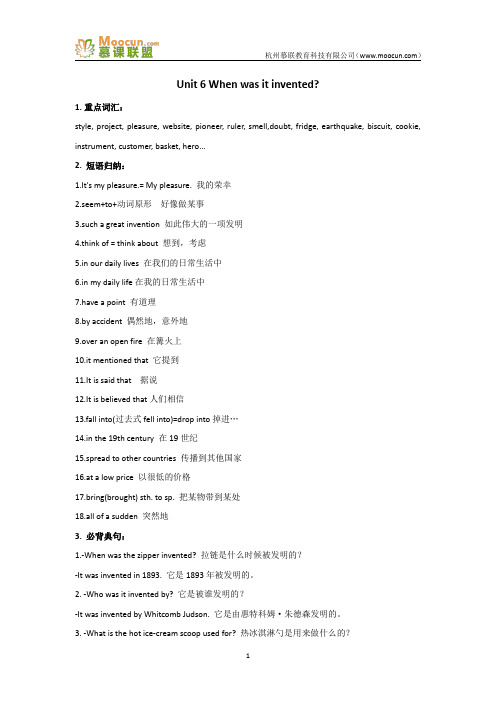
Unit 6 When was it invented?1.重点词汇:style, project, pleasure, website, pioneer, ruler, smell,doubt, fridge, earthquake, biscuit, cookie, instrument, customer, basket, hero...2. 短语归纳:1.It's my pleasure.= My pleasure. 我的荣幸2.seem+to+动词原形好像做某事3.such a great invention 如此伟大的一项发明4.think of = think about 想到,考虑5.in our daily lives 在我们的日常生活中6.in my daily life在我的日常生活中7.have a point 有道理8.by accident 偶然地,意外地9.over an open fire 在篝火上10.it mentioned that 它提到11.It is said that 据说12.It is believed that人们相信13.fall into(过去式fell into)=drop into掉进…14.in the 19th century 在19世纪15.spread to other countries 传播到其他国家16.at a low price 以很低的价格17.bring(brought) sth. to sp. 把某物带到某处18.all of a sudden 突然地3. 必背典句:1.-When was the zipper invented? 拉链是什么时候被发明的?-It was invented in 1893. 它是1893年被发明的。
2. -Who was it invented by? 它是被谁发明的?-It was invented by Whitcomb Judson. 它是由惠特科姆·朱德森发明的。
初中英语人教新目标九年级全一册unit6知识点
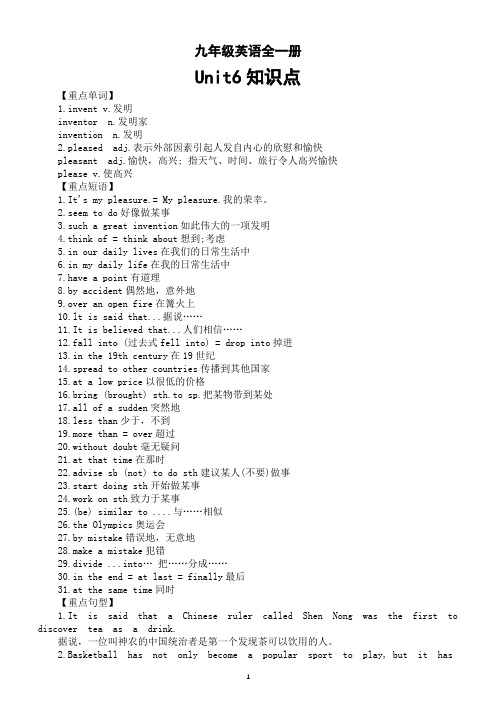
九年级英语全一册Unit6知识点【重点单词】1.invent v.发明inventor n.发明家invention n.发明2.pleased adj.表示外部因素引起人发自内心的欣慰和愉快pleasant adj.愉快,高兴; 指天气、时间、旅行令人高兴愉快please v.使高兴【重点短语】1.It's my pleasure.= My pleasure.我的荣幸。
2.seem to do好像做某事3.such a great invention如此伟大的一项发明4.think of = think about想到;考虑5.in our daily lives在我们的日常生活中6.in my daily life在我的日常生活中7.have a point有道理8.by accident偶然地,意外地9.over an open fire在篝火上10.lt is said that...据说……11.It is believed that...人们相信……12.fall into (过去式fell into) = drop into掉进13.in the 19th century在19世纪14.spread to other countries传播到其他国家15.at a low price以很低的价格16.bring (brought) sth.to sp.把某物带到某处17.all of a sudden突然地18.less than少于,不到19.more than = over超过20.without doubt毫无疑问21.at that time在那时22.advise sb (not) to do sth建议某人(不要)做事23.start doing sth开始做某事24.work on sth致力于某事25.(be) similar to ....与……相似26.the Olympics奥运会27.by mistake错误地,无意地28.make a mistake犯错29.divide ...into…把……分成……30.in the end = at last = finally最后31.at the same time同时【重点句型】1.It is said that a Chinese ruler called Shen Nong was the first to discover tea as a drink.据说,一位叫神农的中国统治者是第一个发现茶可以饮用的人。
Unit6讲义 人教版九年级英语全册
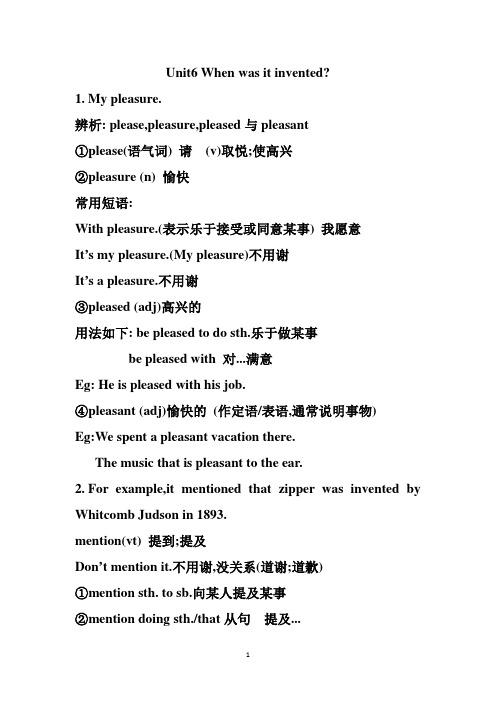
Unit6 When was it invented?1.My pleasure.辨析: please,pleasure,pleased与pleasant①please(语气词) 请(v)取悦;使高兴②pleasure (n) 愉快常用短语:With pleasure.(表示乐于接受或同意某事) 我愿意It’s my pleasure.(My pleasure)不用谢It’s a pleasure.不用谢③pleased (adj)高兴的用法如下: be pleased to do sth.乐于做某事be pleased with 对...满意Eg: He is pleased with his job.④pleasant (adj)愉快的(作定语/表语,通常说明事物)Eg:We spent a pleasant vacation there.The music that is pleasant to the ear.2.For example,it mentioned that zipper was invented by Whitcomb Judson in 1893.mention(vt) 提到;提及Don’t mention it.不用谢,没关系(道谢;道歉)①mention sth. to sb.向某人提及某事②mention doing sth./that从句提及...Eg: Nobody mentioned anything to me about it.Whenever I mention playing basketball,he always says he’s too busy.He mentioned that he met some problem,but nobody helped him.3.It is said that a Chinese ruler called Shen Nong was the first to discover tea as a drink.It is said that ... 据说... 有人说... (it为形式主语,that从句为真正的主语,be said是被动语态形式,其主动语态形式为:People/They say (that)...)“It is+过去分词+that...”结构的常用句型It is believed that...人们认为...It is known that...众所周知...It is reported that...据报道...It is supposed that...据估计...4.Even though many people now know about tea culture,the Chinese are without doubt the ones who best understand the nature of tea.doubt(n)疑问;疑惑相关短语: without doubt毫无疑问;的确no doubt无疑;很可能be in doubt不确定beyond doubt 毫无疑问doubt(v)怀疑(后常接n/pron或that;if/whether引导的从句作宾语)There is no doubt that+句子毫无疑问的是...Eg:They doubt the truth of it.We doubt that you are right.I doubt if/whether he will come earlier this time.4.The number of foreign players,includingChinese players,in the NBA has increased.辨析: include,including与includedinclude(vt)包括;包含including(prep)包括;包含included(adj)包括在内的(后置定语)Eg:Breakfast includes egg,bread and milk.All the students,including me,had a nice day during the vacation.All of us,myself included,like our English teacher.5.These stars encourage young people to work hard to achieve their dreams.辨析:achieve与come trueachieve(vt)实现(主语是人)come true(vi短语)实现(主语是事物)achieve one’s dream=one’s dream come true.6.At the same time,they need to stop competing team from getting the ball into their own basket.①stop sb. from doing sth.阻止某人做某事stop...from...的同义短语prevent...(from)doingkeep...from doing②get into 进入含有get的短语:get ready 准备好get angry 生气get on well 相处得好get well 恢复健康get in the way 挡道get a cold 感冒; 伤风get over 克服(困难等); 从(疾病、失望等)中恢复过来get along 融洽相处;前进,进展; (with)与…相处; 生活get through 通过; 拨通(电话)get in touch with 与…联系; 与…接触7.Today,the popularity of basketball has risen around the world,with many young people dreaming of becoming famous players.“with many young people dreaming of becoming famous players.”是“with+宾语+补足语”(补足语可以是: 现在分词、过去分词、介词短语、形容词或不定式)Eg: She enjoys listening to music with her eyes closed.My mother looked at me with tears in her eyes.Don’t speak with your mouth full.With a lot of work to do,she felt very tired.8.Many young people look up to these basketball heroes and want to become like them.look up to 钦佩;仰慕;尊敬含有look的短语:look forward to期待look down upon瞧不起;轻视look on ...as...把...看作look out for注意观察;留意look sb.up and down上下打量look sb.in the eye正视某人一般过去时的的被动语态①构成: was/were+动词过去分词②各种时态被动语态的结构归纳一般将来时: will/shall be done过去将来时:would/should be done现在进行时:am/is /are being done过去进行时:was/were being done现在完成时:have/has been done过去完成时:had been done③使用被动语态的误区(1)主动句的宾语是each other或反身代词时,不能用作被动语态的主语Eg: The man introduced himself as Mr.White. Himself was introduced as Mr.White.(x)They help each other to study English.Each other is helped to study English.(x)(2)当主动句的谓语动词是表状态的及物动词时,不能用于被动语态.Eg: We will have a meeting.A meeting will be had by us.(3)主动句的宾语是不定式或动名词时,不能用作被动语态中的主语Eg: My brother enjoys watching TV.Watching TV is enjoyed by my brother.(x)He asked to have a try.To have a try was asked by him.(x)(4)主动结构表被动意义1.open,lock,write,read,sell,clean,wash,cut,burn,drive 等词作不及物动词时,它们的主语为物,可用主动语态表示被动意义.Eg:This kind of pen writes very smoothly.The clothes sell well in that store.2.look,sound,taste,smell等系动词用主动结构表被动Eg:The music sounds very beautiful. Hamburgers taste quite delicious.3.be worth doing值得....(用主动结构表示被动) Eg:The book is worth reading.4.require/want/need +doing (用主动结构表示被动) require/want/need to be doneEg: My bike needs repairing.My bike needs to be repaired.。
Unit6单词短语重点句子人教版英语九年级全册
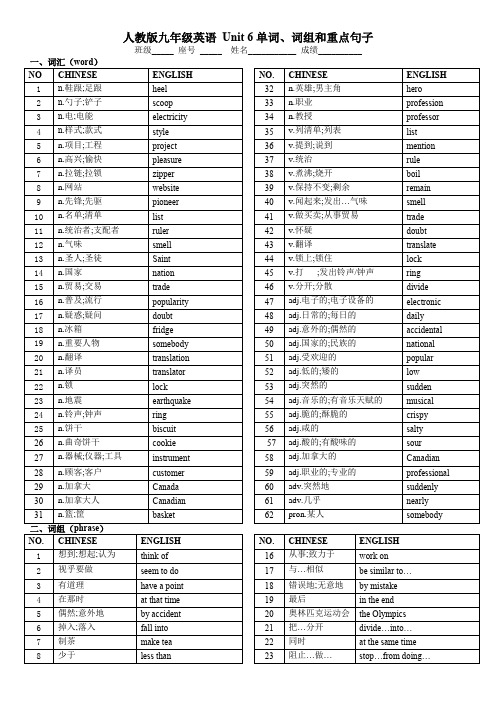
人教版九年级英语Unit 6单词、词组和重点句子班级_____ 座号_____ 姓名___________ 成绩__________1. 是什么时候发明的?我想它是在1876年发明的。
When was the telephone invented?I think it was invented in 1876.2. 带有灯的鞋是被用来做什么的?它们是被用来在黑暗中看东西。
What are shoes with lights used for?They are used for seeing in the dark.3. 据说一位叫神农的中国统治者是第一个发现茶可以作为一种饮品的人。
It is said that a Chinese ruler called Shen Nong was the first to discover tea as a drink.4. 世界上最受欢迎的饮品是偶然间被发明的。
The most popular drink in the world was invented by accident.5. 人们认为茶是在6世纪和7世纪期间被带到韩国和日本的。
It is believed that tea was brought to Korea and Japan during the 6th and 7th centuries.6. 不同的作家把这本书翻译成了不同的语言。
Different writers translated the book into different languages.7. 人们认为历史上的第一场篮球赛是在1891年12月12日举办的。
It is believed that the first basketball game in history was played on December 21,1891.8. 王博士把他班上的男生分成了两队,并教他们玩他的新运动。
人教版九年级英语全册 Unit 6单元测试卷(含答案)

人教版九年级英语全册 Unit 6单元测试卷(含答案)一、单项选择(每小题1分,共15分)1.—Listening to music can help people relax.—You have ________ point. That really helps me a lot.A.a B.an C.the D.不填2.Not only ________ but also ________ is delicious.A.biscuits; cake B.biscuits; cookie C.cake; cookies D.cookies; biscuit 3.Franklin ________ electricity, and Edison ________ the light bulb.A.discovered; discovered B.invented; inventedC.discovered; invented D.invented; discovered4.He is an honest boy. I have no reason to ________ what he said.A.hear B.doubt C.repeat D.believe5.________ may have a chance to be successful if he tries his best.A.None B.Nobody C.Somebody D.Everybody6.________ my classmates ________ playing basketball.A.The number of,like B.The number of,likesC.A number of,like D.A number of,likes7.The sentence will be easy to understand when you ________ it into three parts.A.divide B.translate C.turn D.make8.Nowadays,many TV programs encourage people ________ smoking.A.stop B.stopping C.to stop D.stopped 9.—What do you think of my shirt?It ________ cotton.—It looks nice on you.A.is made in B.is made for C.is made of D.is made by10.The Internet is very useful. We can get a lot of ________ from it.A.thing B.message C.informations D.information11. Teaspoons are used______ things.A.for serve B.to serving C.to serve D.serving12.This kind of drink ______ a ______ smell. Many children like to drink it.A.produces; pleasantB.is made; pleasureC.was refused; gladD.protects; pleasant13. She was seen ___ into the room.A. to comeB. comeC. cameD. comes14. The girl is ___ to go to school.A. enough oldB. old enoughC. too oldD. old too15. I met her ___ in a crowded bus.A. by mistakeB. on purposeC. by accidentD. accident六、完形填空。
英语人教版九年级全册unit 6 Grammar Focus
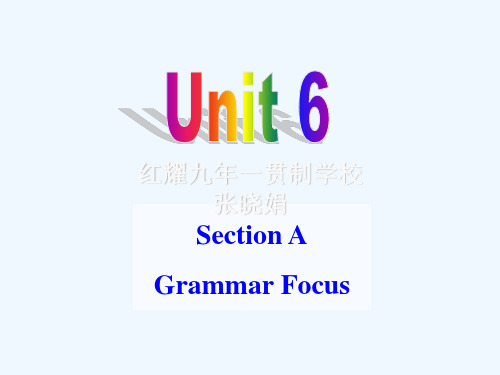
请你给我们表演一个节目。
Read the sentences and pay attention to the underlined parts.
When was the car invented? It was invented in 1885. Who were they invented by? They were invented by Julie Thompson. What are they used for? They are used for seeing in the dark.
your hometown last year? 5. No student is __se_e_n___(see) in the playground.
6. History is __m__a_d_e___ by the people. ( make) 7. He is often __a_s_k_e_d___ to do the work by the
( by us )
主语 谓语动词被动语态的过去分词 介词+ 宾语
主动句变为被动句所遵循的4个步骤:
1. 把原主动句中的宾语变为被动句的主语。 2. 把动词变为被动形式即be+过去分词,
并注意其人称和数随主语的变化,而动 词的时态则保持不变。 3. 原主动句的主语如需要则放在by后面以它 的宾格形式出现(注代词的宾格),如不需 要则可省略。
4. 其它的成分(定语、状语)不变。
过去式被动语态的几种句型
肯定句 主语 + be + 过去分词 + (by…) A sweet song was sung by her on the stage. 2 否定句 主语 + be + not +过去分词 + (by…) A sweet song wasn’t sung by her on the stage. 3 一般疑问句 Be + 主语 +过去分词 + (by…)?
人教版九年级英语全册Unit6知识点
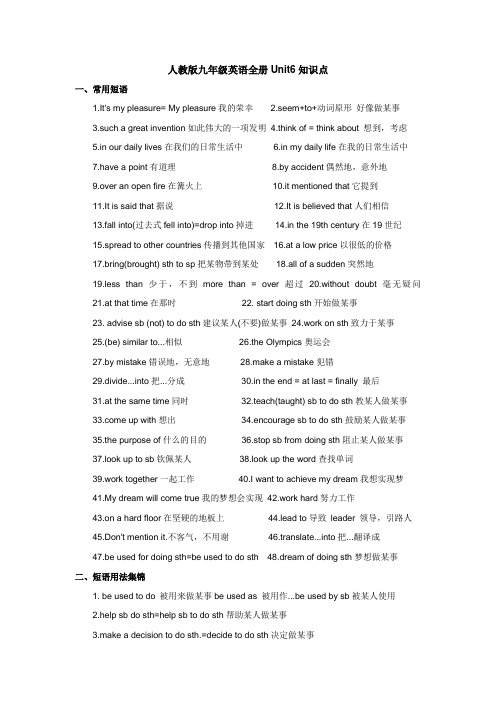
人教版九年级英语全册Unit6知识点一、常用短语1.It's my pleasure= My pleasure我的荣幸2.seem+to+动词原形好像做某事3.such a great invention如此伟大的一项发明4.think of = think about 想到,考虑5.in our daily lives在我们的日常生活中6.in my daily life在我的日常生活中7.have a point有道理8.by accident偶然地,意外地9.over an open fire在篝火上10.it mentioned that它提到11.It is said that据说12.It is believed that人们相信13.fall into(过去式fell into)=drop into掉进14.in the 19th century在19世纪15.spread to other countries传播到其他国家16.at a low price以很低的价格17.bring(brought) sth to sp把某物带到某处18.all of a sudden突然地19.less than少于,不到more than = over 超过20.without doubt毫无疑问21.at that time在那时22. start doing sth开始做某事23. advise sb (not) to do sth建议某人(不要)做某事24.work on sth致力于某事25.(be) similar to...相似26.the Olympics奥运会27.by mistake错误地,无意地28.make a mistake犯错29.divide...into把...分成30.in the end = at last = finally 最后31.at the same time同时32.teach(taught) sb to do sth教某人做某事e up with想出34.encourage sb to do sth鼓励某人做某事35.the purpose of什么的目的36.stop sb from doing sth阻止某人做某事37.look up to sb钦佩某人38.look up the word查找单词39.work together一起工作40.I want to achieve my dream我想实现梦41.My dream will come true我的梦想会实现42.work hard努力工作43.on a hard floor在坚硬的地板上44.lead to导致leader 领导,引路人45.Don't mention it.不客气,不用谢46.translate...into把...翻译成47.be used for doing sth=be used to do sth 48.dream of doing sth梦想做某事二、短语用法集锦1. be used to do 被用来做某事be used as 被用作...be used by sb被某人使用2.help sb do sth=help sb to do sth帮助某人做某事3.make a decision to do sth.=decide to do sth决定做某事4.make sb + adj使某人怎么样make sb do sth使某人做某事be made to do sth被使唤去做某5..in this way这样,用这种方式三、重点语法1.some time 一段时间sometimes 有时some times几次sometime 某个时候2.one of the world's favorite drinks世界最受欢迎的饮料之一.one of 什么之一,后面的名词用复数(一般要加S),动词用单数(一般要加S);favorite,最喜欢的,前面要用“谁的”.3.thousand千hundred百million百万,当它们前面有数字的时候,它们本身不能加S,当它们后面有of的时候它们要加S,但前面的数字和后面的of不能同时存在4.not…until直到…才,I don‘t go to sleep until 11 every day.我每天直到11点才睡觉。
人教版英语九年级全册Unit6 核心常考词汇详解
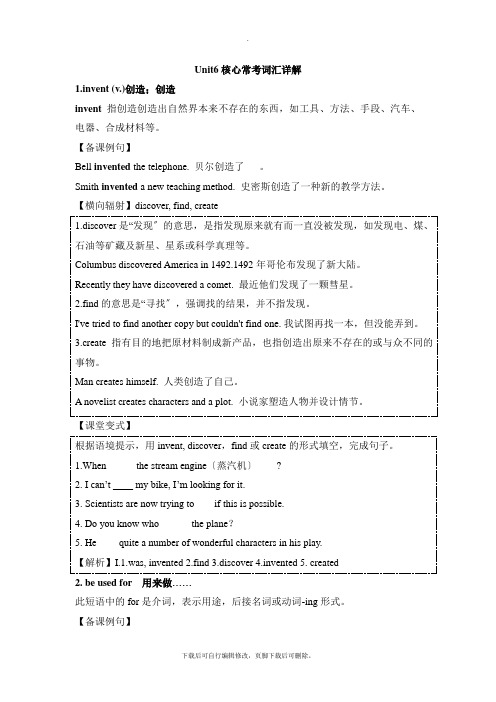
Unit6核心常考词汇详解1.invent (v.)创造;创造invent指创造创造出自然界本来不存在的东西,如工具、方法、手段、汽车、电器、合成材料等。
【备课例句】Bell invented the telephone. 贝尔创造了。
Smith invented a new teaching method. 史密斯创造了一种新的教学方法。
【横向辐射】discover, find, create1.discover是“发现〞的意思,是指发现原来就有而一直没被发现,如发现电、煤、石油等矿藏及新星、星系或科学真理等。
Columbus discovered America in 1492.1492年哥伦布发现了新大陆。
Recently they have discovered a comet. 最近他们发现了一颗彗星。
2.find的意思是“寻找〞,强调找的结果,并不指发现。
I've tried to find another copy but couldn't find one. 我试图再找一本,但没能弄到。
3.create指有目的地把原材料制成新产品,也指创造出原来不存在的或与众不同的事物。
Man creates himself. 人类创造了自己。
A novelist creates characters and a plot. 小说家塑造人物并设计情节。
【课堂变式】根据语境提示,用invent, discover,find或create的形式填空,完成句子。
1.When _____ the stream engine〔蒸汽机〕___?2. I can’t ____ my bike, I’m looking for it.3. Scientists are now trying to ___ if this is possible.4. Do you know who______ the plane?5. He ____quite a number of wonderful characters in his play.【解析】I.1.was, invented 2.find 3.discover 4.invented 5. created2. be used for 用来做……此短语中的for是介词,表示用途,后接名词或动词-ing形式。
人教版初中英语九年级全册Unit6Whenwasitinvented教学设计
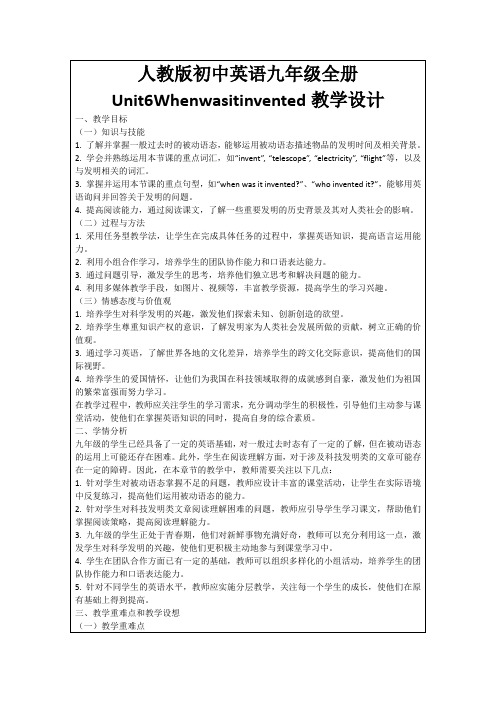
3.九年级的学生正处于青春期,他们对新鲜事物充满好奇,教师可以充分利用这一点,激发学生对科学发明的兴趣,使他们更积极主动地参与到课堂学习中。
4.学生在团队合作方面已有一定的基础,教师可以组织多样化的小组活动,培养学生的团队协作能力和口语表达能力。
2.利用小组合作学习,培养学生的团队协作能力和口语表达能力。
3.通过问题引导,激发学生的思考,培养他们独立思考和解决问题的能力。
4.利用多媒体教学手段,如图片、视频等,丰富教学资源,提高学生的学习兴趣。
(三)情感态度与价值观
1.培养学生对科学发明的兴趣,激发他们探索未知、创新创造的欲望。
2.培养学生尊重知识产权的意识,了解发明家为人类社会发展所做的贡献,树立正确的价值观。
c.采用问题链的形式,引导学生深入阅读课文,通过提问、讨论等方式,帮助学生理解课文内容,并培养他们的批判性思维。
d.创设互动式学习环境,鼓励学生提问和分享,使课堂成为知识交流的平台。
2.教学步骤设想:
a.导入新课:通过展示一些发明物品的图片,激发学生的兴趣,引导他们猜测这些物品的发明时间,自然引入被动语态的学习。
人教版初中英语九年级全册Unit6Whenwasitinvented教学设计
一、教学目标
(一)知识与技能
1.了解并掌握一般过去时的被动语态,能够运用被动语态描述物品的发明时间及相关背景。
2.学会并熟练运用本节课的重点词汇,如“invent”, “telescope”, “electricity”, “flight”等,以及与发明相关的词汇。
3.课后作业设想:
a.设计与课堂活动相关的作业,如让学生选择一ห้องสมุดไป่ตู้发明物品,用英语介绍其发明时间、发明者等,强化学生对被动语态的应用。
人教版新目标九年级全册英语 Unit 6 单元语法知识点考点复习提纲
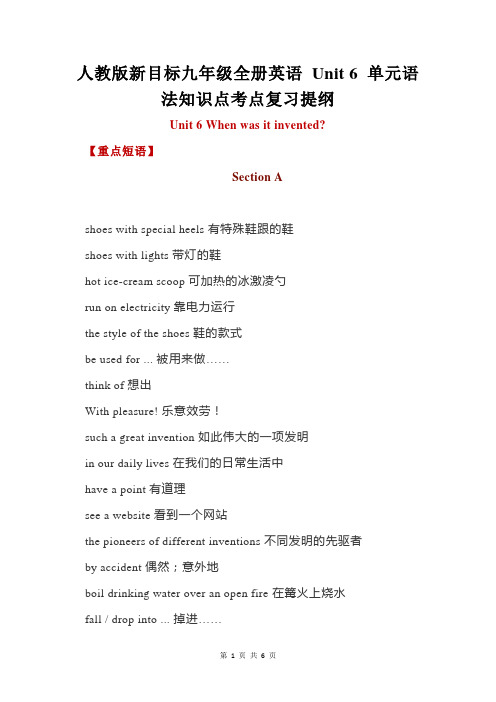
人教版新目标九年级全册英语Unit 6 单元语法知识点考点复习提纲Unit 6 When was it invented?【重点短语】Section Ashoes with special heels 有特殊鞋跟的鞋shoes with lights 带灯的鞋hot ice-cream scoop 可加热的冰激凌勺run on electricity 靠电力运行the style of the shoes 鞋的款式be used for ... 被用来做……think of 想出With pleasure! 乐意效劳!such a great invention 如此伟大的一项发明in our daily lives 在我们的日常生活中have a point 有道理see a website 看到一个网站the pioneers of different inventions 不同发明的先驱者by accident 偶然;意外地boil drinking water over an open fire 在篝火上烧水fall / drop into ... 掉进……produce a nice smell 产生一种香味the saint of tea 茶圣in less than 100 years 在不到一百年的时间里national drink 国饮take place 发生;出现tea culture 茶文化without doubt 毫无疑问;的确understand the nature of tea 了解茶的本质sell ... at a low price 低价卖……translate ... into ... 把……翻译成……all of a sudden 突然;猛地ring the bell 按门铃musical notes 乐符Section Bpotato chips 炸薯条;炸土豆片by mistake 错误地;无意中in the end 最后put lots of salt on ... 在……上面撒很多盐a much-loved and active sport 一种备受欢迎而且剧烈的运动more than 超过;多于in history 历史上a college teacher 一位大学老师divide ... into 把……分开get the ball in the other team’s basket把球投进对方篮筐at the same time 同时stop ... from doing ... 阻止……做……dream of 梦想;幻想;向往not only ... but also ... 不但……而且……the number of ... ……的数量look up to these basketball heroes 钦佩 / 仰慕这些篮球英雄encourage sb. to do sth. 鼓励某人做某事achieve their dreams 实现他们的梦想come up with 提出;想出lead to 导致【考点详解】1. invent v. 发明inventor n. 发明家invention n. 发明2. be used for doing 用来做…(是被动语态)(这个短语的考点有两点,一是used for的意思,二是for后面用动名词)Pens are used for writing. 笔是用来写的。
人教版九年级全一册英语Unit6单元语法知识点总结
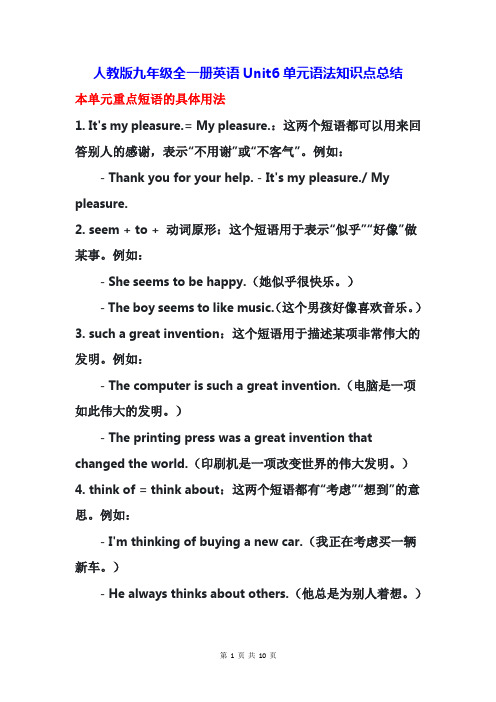
人教版九年级全一册英语Unit6单元语法知识点总结本单元重点短语的具体用法1. It's my pleasure.= My pleasure.:这两个短语都可以用来回答别人的感谢,表示“不用谢”或“不客气”。
例如:- Thank you for your help. - It's my pleasure./ My pleasure.2. seem + to + 动词原形:这个短语用于表示“似乎”“好像”做某事。
例如:- She seems to be happy.(她似乎很快乐。
)- The boy seems to like music.(这个男孩好像喜欢音乐。
)3. such a great invention:这个短语用于描述某项非常伟大的发明。
例如:- The computer is such a great invention.(电脑是一项如此伟大的发明。
)- The printing press was a great invention that changed the world.(印刷机是一项改变世界的伟大发明。
)4. think of = think about:这两个短语都有“考虑”“想到”的意思。
例如:- I'm thinking of buying a new car.(我正在考虑买一辆新车。
)- He always thinks about others.(他总是为别人着想。
)5. in our daily lives/ in my daily life:这两个短语用于描述在日常生活中的情况或活动。
例如:- Technology plays an important role in our daily lives.(科技在我们的日常生活中起着重要的作用。
)- In my daily life, I like to read books and exercise.(在我的日常生活中,我喜欢读书和锻炼。
Unit 6书面表达 人教版英语九年级全册
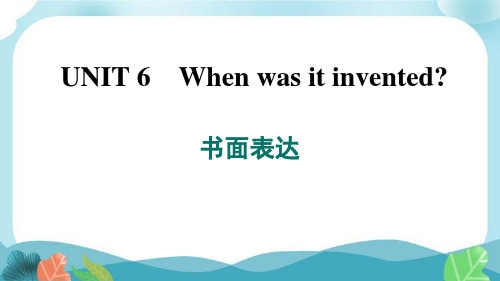
发明物介绍类作文常用句型: ...was invented by... ...have changed our life a lot. Which is the most useful invention? ...was/is used for/to... I hope it will become...
bulb
玻璃和金属
Use 照明, 让人们在夜晚工作或学习成为可能
Advantage
节能(save energy), 环保, 便宜
五、写作模板
However, my favorite invention is
开门见山,点出自 the light bulb.
我 己最喜欢的明发明
最 是得很么
·It was invented by...
三、 素材积累 发明物介绍类作文常用词汇: fridge // invention // robot // mobile phone // TV // computer // light // washing machine // helpful // useful // important // interesting // boring // change // be used for
__It__w_a_s_u_s_e_d__fo_r__p_r_o_v_id_i_n_g__p_e_o_p_le__w_i_th__li_g_h_t_a_n_d__t_h_e_i_n_v_e_n_ti_o_n__ __m_a_d_e__it_p__o_ss_i_b_le__fo_r__p_e_o_p_le__t_o_w_o_r_k__a_n_d__st_u_d_y__a_t_n_i_g_h_t._N__o_w___ __th_e__in_v_e_n_t_i_o_n_h_a_s__b_e_e_n_i_m_p_r_o_v_e_d__a_l_o_t_. _P_e_o_p_le__a_r_e_m__a_k_in_g_____ __b_e_tt_e_r_l_ig_h_t_i_n_g_p_r_o_d_u_c_t_s_. _T_h_e_y__c_a_n_h_e_l_p_t_o_s_a_v_e__e_n_e_rg_y__a_n_d____ __p_r_o_te_c_t_t_h_e_e_n_v_i_r_o_n_m__en__t._W__h_a_t_’_s_m__o_r_e,_t_h_e_y__a_re__c_h_e_a_p_e_r_. ____ ______I_h_o_p_e__it_w__il_l_b_e_c_o_m__e_m__o_re__a_n_d__m_o_r_e__u_se_f_u_l_i_n_t_h_e_f_u_t_u_r_ite invention”
人教版九年级英语全一册Unit_6_When_was_it_inventedppt课件

3c
complete the sentences with the correct forms of the verbs in the box.
1.One of the world's favorite drinks was _in_v__e_n_t_e_d_by accident.
2.Tea was first __d_r_u_n_k_____ by ShenNong about 5,000 years ago.
3.A nice smell was __p_r_o_d_u_c_e_d__ when the tea leaves dropped into the hot water.
4.tTheea6wthaasn_d_b_7r_tho__uc_ge_hn_tt_u_riteos.Korea and Japan during
2.When was the zipper invented ?
in 1893
What will you do if you are really thirsty?
I’d like to drink these drinks.
v喝
n. 饮料
3a Learning aims:
偶然地
by accident
B: It’s used for ___s_tu_d__y_in__g_____________ (study)
pairwork
umbrella
1200 B.C
keep us away from the rain
pen 1850 write
pairwork
camera 1839 take photos
不到100年
take place
人教版九年级英语全册:Unit 6 基础知识梳理
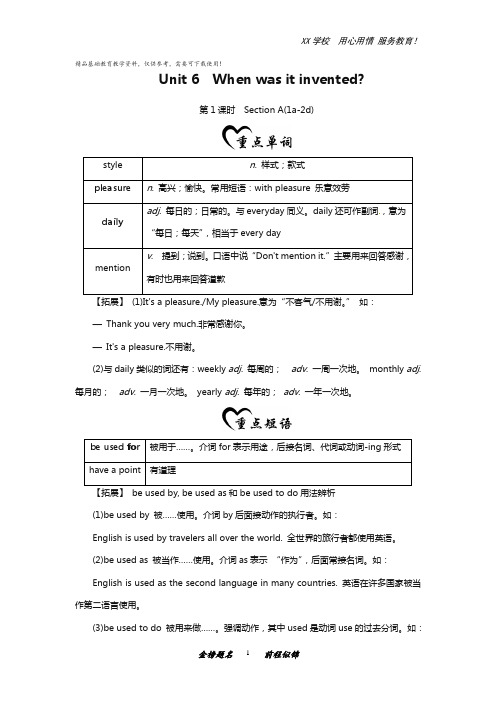
精品基础教育教学资料,仅供参考,需要可下载使用!Unit 6 When was it invented?第1课时Section A(1a2d)style n. 样式;款式pleasure n. 高兴;愉快。
常用短语:with pleasure 乐意效劳daily adj. 每日的;日常的。
与everyday同义。
daily还可作副词,意为“每日;每天”,相当于every daymention v. 提到;说到。
口语中说“Don't mention it.”主要用来回答感谢,有时也用来回答道歉【拓展】(1)It's a pleasure./My pleasure.意为“不客气/不用谢。
”如:—Thank you very much.非常感谢你。
—It's a pleasure.不用谢。
(2)与daily类似的词还有:weekly adj. 每周的;adv. 一周一次地。
monthly adj. 每月的;adv. 一月一次地。
yearly adj. 每年的;adv. 一年一次地。
be used for被用于……。
介词for表示用途,后接名词、代词或动词ing形式have a point 有道理(1)be used by 被……使用。
介词by后面接动作的执行者。
如:English is used by travelers all over the world. 全世界的旅行者都使用英语。
(2)be used as 被当作……使用。
介词as表示“作为”,后面常接名词。
如:English is used as the second language in many countries. 英语在许多国家被当作第二语言使用。
(3)be used to do 被用来做……。
强调动作,其中used是动词use的过去分词。
如:This mac hine is used to clean the floor. 这个机器是用来扫地的。
人教版英语九年级全册单元unit 6 知识点+测试卷+思维导图

Unit 6 When was it invented?1.重点词汇:style, project, pleasure, website, pioneer, ruler, smell,doubt, fridge, earthquake, biscuit, cookie, instrument, customer, basket, hero...2. 短语归纳:1.It's my pleasure.= My pleasure. 我的荣幸2.seem+to+动词原形好像做某事3.such a great invention 如此伟大的一项发明4.think of = think about 想到,考虑5.in our daily lives 在我们的日常生活中6.in my daily life在我的日常生活中7.have a point 有道理8.by accident 偶然地,意外地9.over an open fire 在篝火上10.it mentioned that 它提到11.It is said that 据说12.It is believed that人们相信13.fall into(过去式fell into)=drop into掉进…14.in the 19th century 在19世纪15.spread to other countries 传播到其他国家16.at a low price 以很低的价格17.bring(brought) sth. to sp. 把某物带到某处18.all of a sudden 突然地3. 必背典句:1.-When was the zipper invented? 拉链是什么时候被发明的?-It was invented in 1893. 它是1893年被发明的。
2. -Who was it invented by? 它是被谁发明的?-It was invented by Whitcomb Judson. 它是由惠特科姆·朱德森发明的。
Unit6笔记人教版英语九年级全册
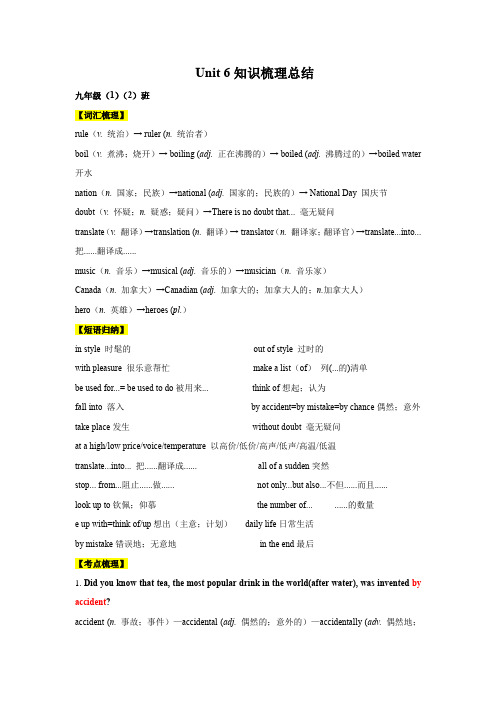
Unit 6知识梳理总结九年级(1)(2)班【词汇梳理】rule(v.统治)→ ruler (n. 统治者)boil(v.煮沸;烧开)→ boiling (adj. 正在沸腾的)→ boiled (adj. 沸腾过的)→boiled water 开水nation(n.国家;民族)→national (adj. 国家的;民族的)→ National Day 国庆节doubt(v.怀疑;n.疑惑;疑问)→There is no doubt that... 毫无疑问translate(v.翻译)→translation (n. 翻译)→ translator(n.翻译家;翻译官)→translate...into...把......翻译成......music(n.音乐)→musical (adj. 音乐的)→musician(n.音乐家)Canada(n.加拿大)→Canadian (adj. 加拿大的;加拿大人的;n.加拿大人)hero(n.英雄)→heroes (pl.)【短语归纳】in style 时髦的out of style 过时的with pleasure 很乐意帮忙make a list(of)列(...的)清单be used for...= be used to do被用来... think of想起;认为fall into 落入by accident=by mistake=by chance偶然;意外take place发生without doubt 毫无疑问at a high/low price/voice/temperature 以高价/低价/高声/低声/高温/低温translate...into... 把......翻译成...... all of a sudden突然stop... from...阻止......做...... not only...but also...不但......而且......look up to钦佩;仰慕the number of... ......的数量e up with=think of/up想出(主意;计划)daily life日常生活by mistake错误地;无意地in the end最后【考点梳理】1.Did you know that tea, the most popular drink in the world(after water), was invented by accident?accident (n.事故;事件)—accidental (adj.偶然的;意外的)—accidentally (adv.偶然地;意外地)by accident=by chance偶然;意外e.g. Please be careful, or you will have a car accident.This piece of music was invented by accident.2.It is said that a Chinese ruler called Shen Nong was the first to discover tea as a drink. It is said that... 据说......(It是形式主语,that从句是真正主语)It is believed that... 人们认为...It is reported that... 据报道...3.It produced a nice smell so he tasted the brown water.smell n. 气味;v.发出......气味;闻到①作可数名词,意为“气味”。
人教版英语九年级全一册Unit 6听力原文及翻译
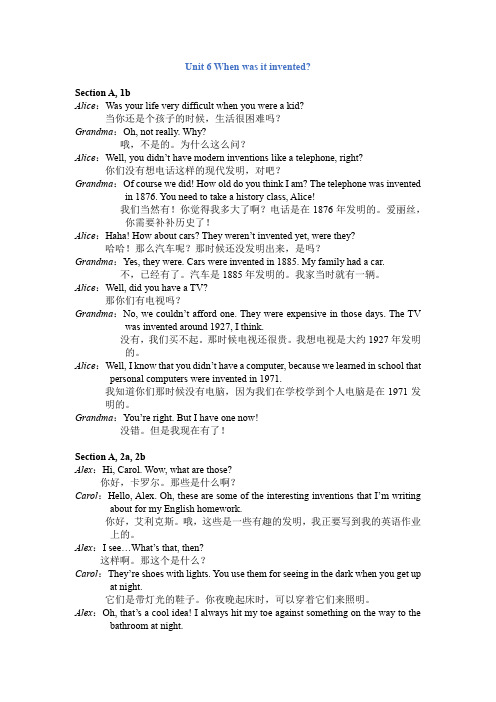
Unit 6 When was it invented?Section A, 1bAlice:Was your life very difficult when you were a kid?当你还是个孩子的时候,生活很困难吗?Grandma:Oh, not really. Why?哦,不是的。
为什么这么问?Alice:Well, you didn’t have modern inventions like a telephone, right?你们没有想电话这样的现代发明,对吧?Grandma:Of course we did! How old do you think I am? The telephone was invented in 1876. You need to take a history class, Alice!我们当然有!你觉得我多大了啊?电话是在1876年发明的。
爱丽丝,你需要补补历史了!Alice:Haha! How about cars? They weren’t invented yet, were they?哈哈!那么汽车呢?那时候还没发明出来,是吗?Grandma:Yes, they were. Cars were invented in 1885. My family had a car.不,已经有了。
汽车是1885年发明的。
我家当时就有一辆。
Alice:Well, did you have a TV?那你们有电视吗?Grandma:No, we couldn’t afford one. They were expensive in those days. The TV was invented around 1927, I think.没有,我们买不起。
那时候电视还很贵。
我想电视是大约1927年发明的。
Alice:Well, I know that you didn’t have a computer, because we learned in school that personal computers were invented in 1971.我知道你们那时候没有电脑,因为我们在学校学到个人电脑是在1971发明的。
- 1、下载文档前请自行甄别文档内容的完整性,平台不提供额外的编辑、内容补充、找答案等附加服务。
- 2、"仅部分预览"的文档,不可在线预览部分如存在完整性等问题,可反馈申请退款(可完整预览的文档不适用该条件!)。
- 3、如文档侵犯您的权益,请联系客服反馈,我们会尽快为您处理(人工客服工作时间:9:00-18:30)。
The zipper? Is it really such a great invention?
Think about how often it’s used in our daily lives. You can see zippers on dresses, trousers, shoes, bags… almost everywhere!
2. Who is the writer of Cha Jing? Lu Yu.
3a Read the passage quickly and
match each paragraph with its main idea.
Para. 1 Lu Yu and his book Cha Jing Para. 2 How tea spread to other countries Para. 3 How tea was invented by accident
偶然;意外地
3b Read the passage again and answer the questions.
1. When was tea first drunk? I_t_w__a_s_f_ir_s_t_d_r_u_n_k__a_b_o_u_t_5_,_0_0_0_y_e_a_r_s_a_g_o_._
Really? So when did it become popular?
Around 1917.
Let’s enjoy a video.
Answer the questions according to the video.
1. What is the video about? It’s about the tea culture in China.
2. How was tea invented? _S_o_m_e__le_a_v_e_s_f_r_o_m__a__te_a__p_la_n_t__fe_l_l _in_t_o__th_e_ _b_o_il_in_g__w_a_t_e_r_. _It__p_r_o_d_u_c_e_d_a__n_ic_e__sm__e_ll___ _a_n_d_t_a_s_te_d__d_e_li_c_io_u__s.__________________
Well, you do seem to have a point…
Of course! I thought about it because I saw a website last week. The pioneers of different inventions were listed there. For example, it mentioned that the zipper was invented by Whitcomb Judson in 1893. But at that time, it wasn’t used widely.
is believed that tea w__a_s_d_r_u_n_k_ (drink) 5,000
years ago. It _is__sa_i_d_ (say) that a Chinese ruler
Fill in the blanks with the proper forms
according to the first paragraph.
Tea (after water), the most popular drink in
the world _w_a_s_i_n_v_e_n_t_e_d (invent) by accident. It
n. 圣人,圣徒
3. Who is called “the saint of tea”? L__u_Y__u_i_s_c_a_ll_e_d_“_t_h_e__sa_i_n_t_o_f_t_e_a_”_._____
4. What is Cha Jing about? _I_t_d_e_s_c_r_ib_e_s__h_o_w__te_a__p_la_n_t_s_w__e_r_e_g_r_o_w_n_ _a_n_d__u_s_e_d_t_o__m_a_k_e__te_a_._______________ 5. When was tea brought to other countries? _I_t _w_a_s__b_r_o_u_g_h_t _t_o_K__o_re_a__a_n_d__J_a_p_a_n____ _d_u_r_i_n_g_t_h_e__6_th__a_n_d__7_th__c_e_n_tu_r_i_e_s_a_n_d__to_ _E_n__g_la_n_d__a_r_o_u_n_d_1_6_6_0_._______________
listed there. 5. It mentioned that the zipper was inventome students role-play the conversation in 2d. Hey Roy, the subject for my school project is “Small inventions that changed the world.” Can you help me think of an invention?
Check the homework. 1. When was the car invented? 2. They are used for changing the style of the
shoes. 3. Think about how often it’s used in our
daily lives. 4. The pioneers of different inventions were
